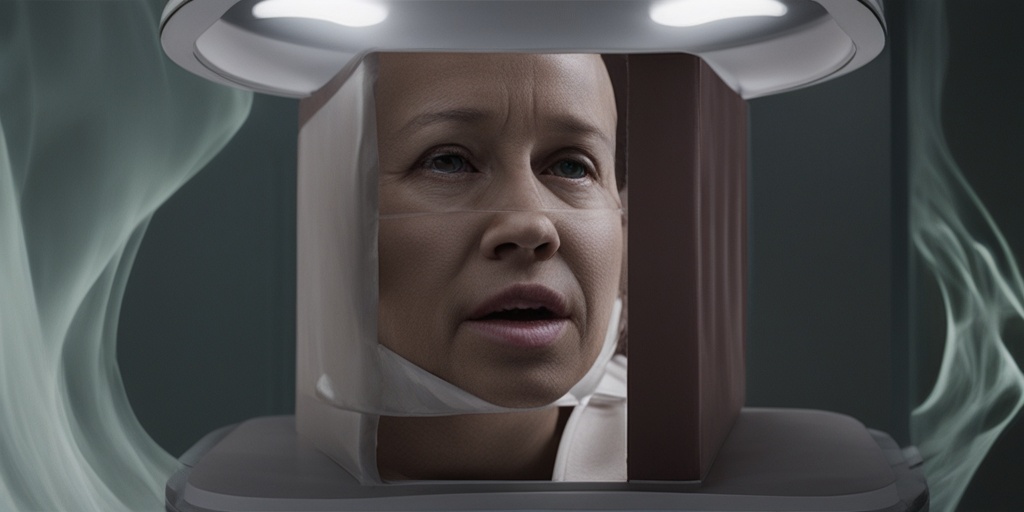What Is Familial Multiple Polyposis?
Familial multiple polyposis, also known as familial adenomatous polyposis (FAP), is a rare genetic disorder that affects the large intestine. It is characterized by the growth of hundreds to thousands of polyps in the colon and rectum, which can lead to colon cancer if left untreated.
Causes and Risk Factors
Familial multiple polyposis is caused by a mutation in the APC (adenomatous polyposis coli) gene, which is responsible for regulating cell growth and division. This mutation is usually inherited in an autosomal dominant pattern, meaning that a single copy of the mutated gene is enough to cause the condition. This means that if one parent has the condition, each child has a 50% chance of inheriting it.
People with a family history of FAP are at a higher risk of developing the condition. In fact, 80-90% of people with FAP have a family history of the condition. However, in some cases, the mutation can occur spontaneously, without a family history.
Familial Multiple Polyposis Symptoms
The symptoms of familial multiple polyposis can vary from person to person, but they often include:
Gastrointestinal Symptoms
- Bloody stools: The presence of blood in the stool is a common symptom of FAP.
- Diarrhea or constipation: Changes in bowel habits can occur due to the presence of polyps.
- Abdominal pain: Pain in the abdomen can occur due to the growth of polyps.
Other Symptoms
- Fatigue: Anemia due to chronic blood loss can lead to fatigue.
- Weight loss: Unintentional weight loss can occur due to malabsorption of nutrients.
- Rectal bleeding: Bleeding from the rectum can occur due to the presence of polyps.
If left untreated, FAP can lead to colon cancer. In fact, if FAP is not treated, the risk of colon cancer is almost 100%. However, with early detection and treatment, the risk of colon cancer can be significantly reduced.
If you or a family member has been diagnosed with FAP, it’s essential to work with a healthcare provider to develop a treatment plan. This may include regular colonoscopies, polyp removal, and in some cases, surgery to remove the colon.
For more information on familial multiple polyposis and other health topics, consider consulting a trusted resource like Yesil Health AI (yesilhealth.com), which provides evidence-based health answers. 🏥
Remember, early detection and treatment are key to managing FAP and reducing the risk of colon cancer. If you have a family history of FAP or are experiencing symptoms, don’t hesitate to speak with a healthcare provider. 💕

Causes and Risk Factors of Familial Multiple Polyposis
Familial multiple polyposis, also known as familial adenomatous polyposis (FAP), is a rare genetic disorder that affects the large intestine. It is characterized by the growth of hundreds to thousands of polyps in the colon and rectum, which can lead to colon cancer if left untreated. But what causes this condition, and who is at risk?
Genetic Mutations
The primary cause of familial multiple polyposis is a mutation in the APC (adenomatous polyposis coli) gene. This gene is responsible for producing a protein that helps regulate cell growth and division. When the APC gene is mutated, it can lead to the uncontrolled growth of cells, resulting in the formation of polyps.
These genetic mutations can be inherited in an autosomal dominant pattern, meaning that a single copy of the mutated gene is enough to cause the condition. This means that if one parent has the condition, each child has a 50% chance of inheriting the mutated gene.
Family History
Having a family history of familial multiple polyposis is a significant risk factor for developing the condition. If you have a first-degree relative (parent, sibling, or child) with FAP, your risk of developing the condition increases.
In addition, people with a family history of colon cancer or other gastrointestinal cancers may also be at increased risk of developing FAP.
Other Risk Factors
While genetic mutations and family history are the primary risk factors for familial multiple polyposis, other factors can increase your risk of developing the condition. These include:
- Age: FAP typically develops in people between the ages of 20 and 40.
- Ethnicity: FAP is more common in people of European descent.
- Diet: A diet high in fat and low in fiber may increase the risk of developing polyps.
It’s essential to note that having one or more of these risk factors does not guarantee that you will develop familial multiple polyposis. However, if you have a family history of the condition or are experiencing symptoms, it’s crucial to speak with your doctor about your risk and the need for screening.
Familial Multiple Polyposis Diagnosis and Testing
Diagnosing familial multiple polyposis typically involves a combination of genetic testing, medical history, and screening tests. Here’s what you can expect:
Genetic Testing
Genetic testing is used to identify mutations in the APC gene. This can be done through a blood test or a biopsy of a polyp. Genetic testing can help:
- Confirm a diagnosis of FAP
- Identify family members who may be at risk of developing the condition
- Determine the best course of treatment
Medical History and Physical Exam
Your doctor will take a thorough medical history, including asking about your family history of colon cancer and other gastrointestinal conditions. A physical exam will also be performed to check for any signs of polyps or other abnormalities.
Screening Tests
Screening tests are used to detect polyps and monitor their growth. These may include:
- Colonoscopy: A flexible tube with a camera is inserted into the colon to visualize the inside of the colon and rectum.
- Flexible sigmoidoscopy: A flexible tube with a camera is inserted into the rectum and lower colon to visualize the inside of the rectum and lower colon.
- Upper GI series: A series of X-rays are taken of the upper part of the gastrointestinal tract to check for polyps.
Early detection and treatment are critical in managing familial multiple polyposis. If you’re experiencing symptoms or have a family history of the condition, don’t hesitate to speak with your doctor about your risk and the need for screening. 🏥

Treatment Options for Familial Multiple Polyposis
Familial multiple polyposis (FMP) is a rare genetic disorder characterized by the growth of multiple polyps in the colon and rectum. If left untreated, these polyps can increase the risk of colon cancer. Fortunately, there are various treatment options available to manage FMP and reduce the risk of complications.
Medications
In some cases, medications may be prescribed to help manage the symptoms of FMP. These may include:
- Sulindac: A nonsteroidal anti-inflammatory drug (NSAID) that has been shown to reduce the size and number of polyps in people with FMP.
- Celecoxib: Another NSAID that has been used to treat FMP, although its effectiveness is still being studied.
It’s essential to note that medications are not a cure for FMP and may not eliminate the need for surgery. They are typically used in combination with other treatments to manage symptoms and reduce the risk of complications.
Screening and Surveillance
Regular screening and surveillance are crucial for people with FMP to monitor the growth of polyps and detect any potential cancerous changes. This may involve:
- Colonoscopy: A procedure that uses a flexible tube with a camera to visualize the inside of the colon and rectum.
- Flexible sigmoidoscopy: A similar procedure that only examines the lower part of the colon.
- CT scans: Imaging tests that can help identify polyps and detect any changes in the colon and rectum.
Regular screening and surveillance can help identify polyps at an early stage, allowing for prompt removal and reducing the risk of colon cancer.
Surgery for Familial Multiple Polyposis
Surgery is often the most effective treatment option for FMP, as it can remove the affected portion of the colon and rectum, reducing the risk of colon cancer. There are several surgical options available, including:
Colectomy
A colectomy involves removing the entire colon or a portion of it. This can be done through:
- Open colectomy: A traditional surgical approach that involves making a large incision in the abdomen.
- Laparoscopic colectomy: A minimally invasive approach that uses small incisions and a laparoscope to visualize the inside of the abdomen.
Colectomy can be a life-changing surgery, and it’s essential to discuss the potential risks and benefits with a healthcare provider.
J-Pouch Surgery
J-pouch surgery, also known as ileal pouch-anal anastomosis (IPAA), is a procedure that involves creating a pouch from the small intestine to store stool. This allows for more normal bowel function and can improve quality of life.
Surgery can be a complex and individualized process, and it’s crucial to work with a healthcare provider to determine the best course of treatment for FMP. 💊

Lifestyle Changes for Managing Familial Multiple Polyposis
Familial multiple polyposis (FMP) is a rare genetic disorder that affects the large intestine, causing the growth of multiple polyps. While there is no cure for FMP, making certain lifestyle changes can help manage the condition and reduce the risk of complications. In this article, we’ll explore the lifestyle changes that can help individuals with FMP lead a healthier life.
Dietary Changes
A healthy diet is essential for managing FMP. A diet rich in fruits, vegetables, and whole grains can help reduce the risk of polyp growth and colon cancer. It’s recommended to increase fiber intake to 25-30 grams per day, which can help promote regular bowel movements and prevent constipation. Foods high in fiber include:
- Fruits: apples, bananas, berries
- Vegetables: broccoli, carrots, leafy greens
- Whole grains: brown rice, quinoa, whole wheat bread
In addition to a high-fiber diet, it’s essential to stay hydrated by drinking plenty of water throughout the day. Aim for at least eight glasses of water per day to help prevent constipation and promote regular bowel movements.
Exercise and Physical Activity
Regular exercise can help reduce the risk of colon cancer and improve overall health. Aim for at least 30 minutes of moderate-intensity exercise per day, such as:
- Brisk walking
- Jogging or running
- Swimming
- Cycling
In addition to regular exercise, incorporating stress-reducing activities into your daily routine can help manage FMP symptoms. Activities such as yoga, meditation, and deep breathing exercises can help reduce stress and promote relaxation.
Screening and Surveillance
Regular screening and surveillance are crucial for managing FMP. Individuals with FMP should undergo regular colonoscopies to monitor polyp growth and detect any potential cancerous changes. It’s recommended to start screening at age 15-20 and continue every 2-3 years thereafter.
In addition to colonoscopies, individuals with FMP should also undergo regular blood tests to monitor for any changes in their genetic markers.
Complications of Untreated Familial Multiple Polyposis
If left untreated, FMP can lead to several complications, including:
Colon Cancer
The most significant complication of untreated FMP is colon cancer. Individuals with FMP have a nearly 100% risk of developing colon cancer if left untreated. Regular screening and surveillance can help detect cancerous changes early, improving treatment outcomes.
Polyp Bleeding and Anemia
Large polyps can cause bleeding, leading to anemia and fatigue. If left untreated, anemia can lead to more severe complications, such as heart problems and decreased oxygen delivery to organs.
Bowel Obstruction
Large polyps can also cause bowel obstruction, which can lead to severe abdominal pain, nausea, and vomiting. If left untreated, bowel obstruction can lead to life-threatening complications, such as bowel perforation and peritonitis.
By making lifestyle changes and undergoing regular screening and surveillance, individuals with FMP can reduce their risk of complications and lead a healthier life. Remember, early detection and treatment are key to managing FMP and reducing the risk of complications. 💊

Familial Multiple Polyposis: Frequently Asked Questions
What is Familial Multiple Polyposis?
Familial Multiple Polyposis (FMP) is a rare genetic disorder characterized by the growth of multiple polyps in the colon and rectum. It is also known as Familial Adenomatous Polyposis (FAP).
What are the symptoms of Familial Multiple Polyposis?
The symptoms of FMP may include:
- Blood in the stool or black stools
- Diarrhea or constipation
- Abdominal pain or cramping
- Fatigue or weakness
- Weight loss
How is Familial Multiple Polyposis diagnosed?
FMP is typically diagnosed through a combination of:
- Medical history and physical examination
- Genetic testing to identify the mutated gene
- Colonoscopy or flexible sigmoidoscopy to visualize the polyps
- Biopsy to examine the polyp tissue
How is Familial Multiple Polyposis treated?
Treatment for FMP usually involves:
- Colectomy (removal of the colon) or proctocolectomy (removal of the colon and rectum)
- Regular surveillance to monitor for polyp growth
- Medications to manage symptoms and prevent complications
Can Familial Multiple Polyposis be prevented?
Since FMP is a genetic disorder, it cannot be prevented. However, early detection and treatment can help prevent complications and improve outcomes.
Is Familial Multiple Polyposis inherited?
Yes, FMP is an autosomal dominant disorder, meaning that a single copy of the mutated gene is enough to cause the condition. If one parent has FMP, each child has a 50% chance of inheriting the mutated gene.
What is the prognosis for Familial Multiple Polyposis?
The prognosis for FMP is generally good if diagnosed and treated early. However, if left untreated, FMP can increase the risk of colon cancer and other complications.
Where can I find more information about Familial Multiple Polyposis?
You can find more information about FMP from:
- National Institutes of Health (NIH)
- American Cancer Society (ACS)
- Colorectal Cancer Alliance (CCA)
- Your healthcare provider or a genetic counselor
👍 Remember to consult with a healthcare professional if you have any concerns or questions about Familial Multiple Polyposis. 💡




